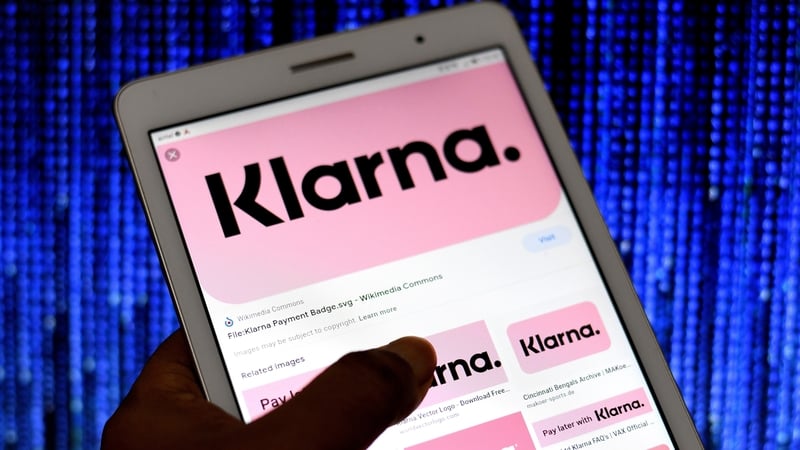Economists and market watchers think the world may have a new recession indicator – the fact that more people can now take out a small loan to pay for their takeaway.
This relates to a recently-announced partnership between Klarna and DoorDash – which is a big food delivery service in the US. Klarna has also partnered with Deliveroo Ireland (which was recently acquired by DoorDash). So we’re not being left out in being able to borrow our way to a burger and chips.
Let’s take a step back – what is Klarna?
Klarna is one of the main players offering what’s called ‘buy now, pay later’ services. It’s a Swedish company that’s actually been around for 20 years, though it only launched in Ireland just under four years ago.
And the way its BNPL business works is that you buy something from a retailer that partners with them – generally online. Then when you get to the checkout you’re giving the option of either paying upfront as you normally would, or you can break the amount up and pay it in instalments over a number of weeks. That might mean breaking up a purchase price into four equal payments, spaced out over six weeks.
So, for example if you buy a €500 TV, you’d pay €125 on the day, then another €125 in two weeks’ time, another €125 in four weeks and then the last payment after six weeks.
And when you do that there’s no interest applied, no fee or charge or anything like that – you pay the same as you would have if you’d just bought it outright on day one. Instead, Klarna generally makes its money by charging a commission to the retailer for handling the payment.
In a way it’s very similar in spirit to the old-fashioned hire purchase option that a lot of appliance retailers here have offered for years. The big difference is that it’s generally done over a shorter period of time – so it’s a matter of weeks rather than months or years. And it’s generally offered at a lower, or now cost altogether.
And, it being a fintech, Klarna is designed to be easy to get set up on and use – so there’s a much lower barrier to entry, and customers can get spending through it quite quickly.
But while Klarna is the big player in this market, it’s not the only one offering BNPL. Revolut offers it too – although it does charge a transaction fee, so it isn’t entirely free.
Retailers like Very have their own buy now, pay later option. Meanwhile there’s Humm, which a lot of retailers here use. That’s very much in the mould of the old fashioned hire purchase model mentioned before.
Apple, meanwhile, also offer a BNPL option in some countries – but not in Ireland.
Is there anything wrong with using BNPL?

Not necessarily.
Some people liken it to a credit card because, just like cards, BNPL is generally a relatively small, unsecured loan with minimal baggage attached.
And, like a credit card, if you’re smart in the way you use it, it won’t cost you anything extra. In fact it can become simply another tool you have to manage your finances and expenses.
But, like a credit card, BNPL does create an additional cost if you don’t make your repayments in time. It could go from being free to very expensive, very quickly. And if you completely lose control of the debt, it could become a major problem for you. In the case of Klarna, it does warn customers that missed payments may incur a late fee – and it also reserves the right to pass on your bill to a debt collector, which obviously could get messy fast.
Anecdotal evidence suggests that the company is more inclined to just write the debt off – certainly if it’s small – and then block the user from being able to borrow anything else from them. But the risk remains that you could get pursued by what can often be an aggressive third party, which will apply fees and charges of their own beyond the money that you owe.
But even without it getting to that extreme stage, not clearing a BNPL loan in time could become downright expensive. One of the other providers in Ireland offers interest free repayments for up to six months – but if you fail to clear what you owe by then, you get hit with a near 40% interest rate. That is approaching pay day lender territory.
And bear in mind that this kind of lending generally isn’t done with any kind of credit check behind it. That’s part of what makes it so accessible to people, and so easy to get up and running. But it also means that the companies lending users the money don’t have much information on their financial history, or on their repayment capacity, and so on.
And one of the concerns expressed by the Money Advice and Budgeting Service (MABS) about this type of lending is that it could lead to a lot of customers doing what they call ‘credit stacking’. This is where they have multiple, small loans spread across multiple providers.
Maybe some are BNPL loans, and maybe they have a credit card or two as well. And each of them on their own might not be worth very much or particularly hard to manage – but combined they add up to a sizable ball of debt that is a burden to keep on top of. And the risk there is that, quite quickly, people can get overwhelmed by this, start missing payments, and start seeing the penalties and interest charges mount. Which just makes escaping the situation that much harder.
Which is a big risk to take for a meal…

Absolutely – and this is part of the concern that has been raised about this new dynamic.
Because as cautious as you should be when borrowing for anything, big or small, when it’s a purchase like an appliance, or even some clothes, there’s a tangible benefit there. You would imagine that it’s something the user will get value out of for a long time to come – long after they’ve actually covered the cost of it.
But if they’re borrowing money to pay for a coffee and a sandwich, it’s going to be gone within an hour of them taking on the debt – and yet they’ll still be expected to pay for it for weeks to come.
Klarna, for its part, has defended these kinds of partnerships with food delivery apps and has made the argument that people have been using overdrafts and their credit cards to pay for coffees and takeaways for decades. The chances are, it says, that they were hit with hefty interest charges and fees when they did that. Which is true.
Though personal finance professionals would urge people not to use credit cards or overdrafts for their food and drink; their advice isn’t to replace one type of debt with another. So it may not be the strongest argument in favour of using Klarna.
But what this move by Klarna and DoorDash – and Deliveroo here – to partner up is being seen as by some market watchers is one sign of the problems that are bubbling under the surface in the economy – particularly in the US.
Just like Ireland, that country has obviously gone through a cost of living crisis over recent years –It was a major issue in the run up to the Presidential Election; and the price of eggs has remained a talking point in recent months. And now we’re seeing the prospect of consumer prices there rising at a faster pace once again in the coming months, because of the impact of Donald Trump’s tariffs.
And that’s led to this BNPL offer becoming attractive to enough consumers that Klarna and DoorDash think it’s worth pursuing.
Of course the internet has had great fun with this too – with tonnes of memes based around what people feel is the absurdity of the situation. There are lots of references to The Big Short and Wolf of Wall Street in there, talk about Taco Bell Credit Default Swaps, and one tweet saying ‘it’s 2026 and I have defaulted on my burrito debt’
But all that aside, finance experts feel that – if borrowing money to pay for an everyday luxury like a coffee or a pizza, and maybe even groceries, is now attractive or necessary for a lot of consumers – then there is something fundamentally wrong with the system. And things are probably only going to get worse.
Are Klarna even making money on all of this?

No – not at the moment at least. In fact their losses have grown considerably recently.
It posted quarterly results last month, which showed that its revenue and customer base was growing – but so too was the number of customers that were defaulting on their loans.
It said $136m worth of loans were lost in the three month period – which was up 17% year on year.
And if even some of that growth is coming from the likes of loans for food deliveries, it puts them in a bit of a bind. Because it’s not like they can go and repossess a burrito – and they’re probably going to even have a hard time getting a debt collection company interested in taking on such a tiny debt, especially not in a way that’s going to be very financially beneficial.
It should be said the rise in defaults wasn’t the only thing that fed into their costs in the period – the cost of funding those loans got more expensive, while they also started offering staff share-based payments.
But the fact that they were losing more of the money they were supposedly lending out did still feed into a more-than doubling in their losses for the period, with a net loss of $99m being 110% higher than its first quarter of 2024.
And those figures represented the latest in a string of bad news stories for Klarna.
It recently announced it was looking to hire 700 customer service workers, having previously tried to fill those rose with AI, only to find out that the quality of their service dipped as a result.
And back in April the company also announced that it was pausing its plan to float shares on the stock exchange. It blamed the volatility created by Donald Trump’s tariffs as the main reason for that, but there was a feeling within the market that the company wasn’t quite ready to invite the level of scrutiny that would-be investors would require.
And the big risk for them and businesses like them is that if there is to be an economic slowdown globally – which is is expected – consumers are likely going to be squeezed even more than they are at the moment.
That might see people pull back from buying things that they don’t already have the money for – meaning they won’t need Klarna. Or it could mean they buy things through Klarna and then just refuse to pay them back.
And either of those scenarios would mean that the fundamentals of the business would come under even greater pressure than is already the case.




